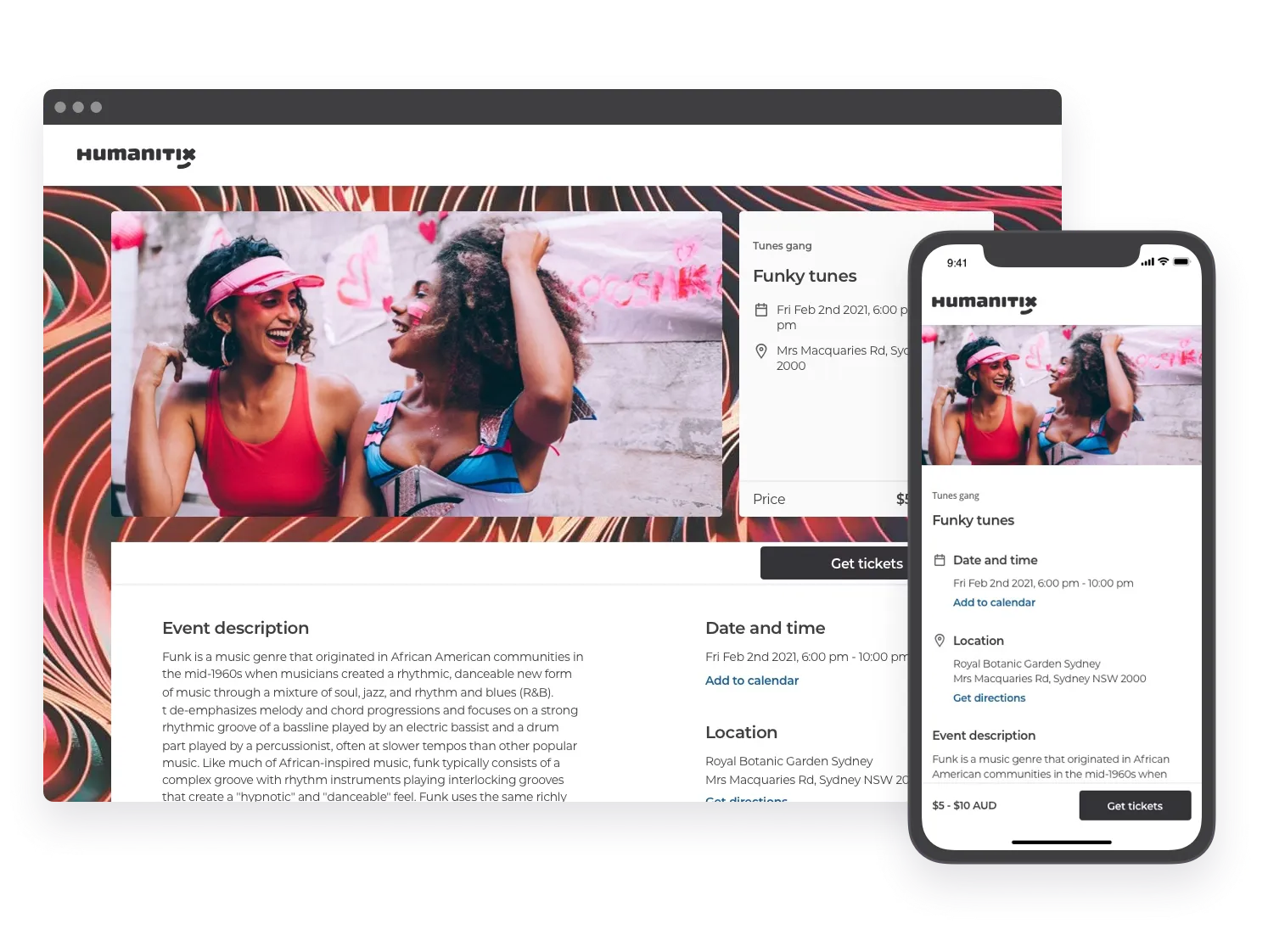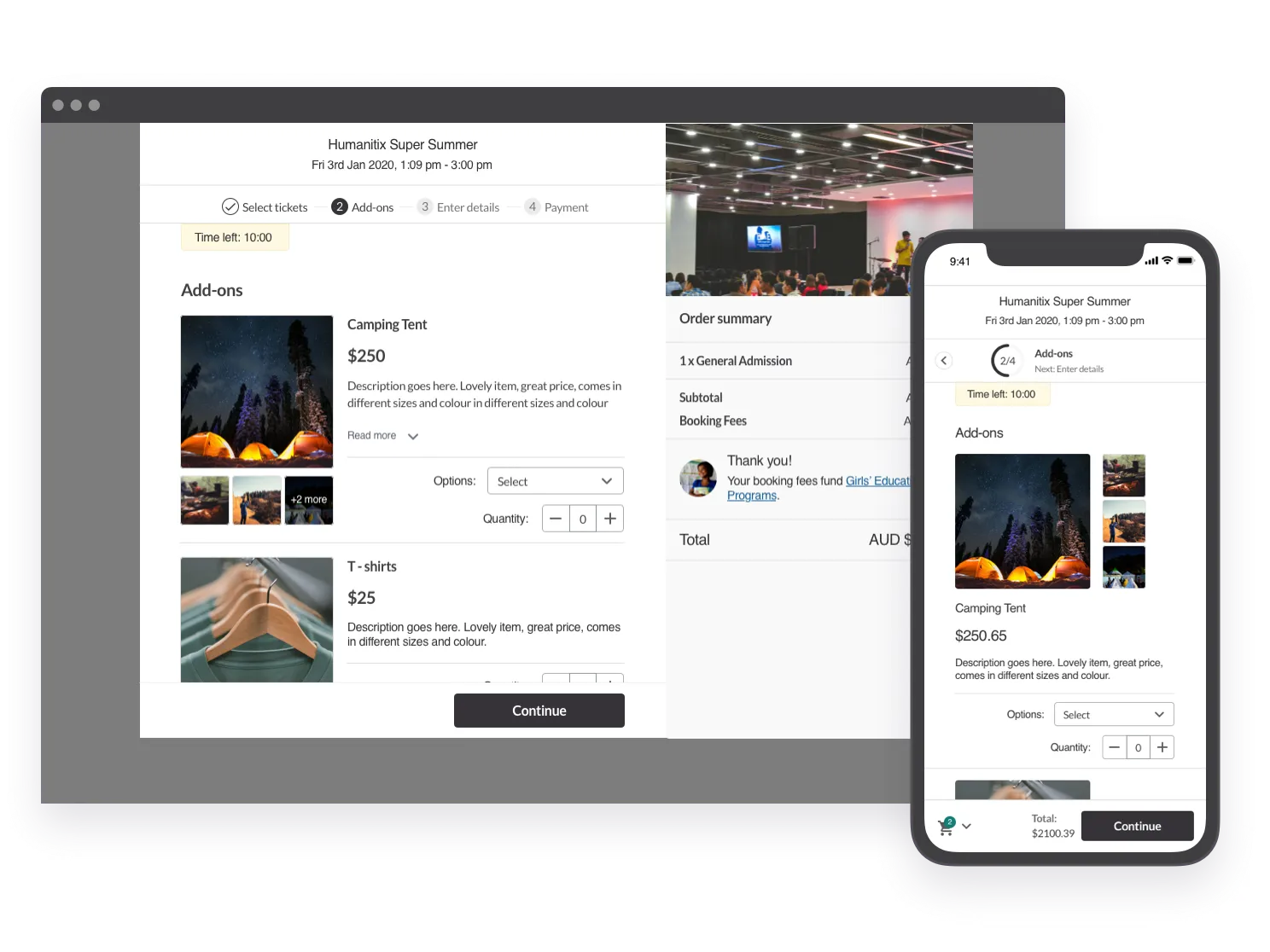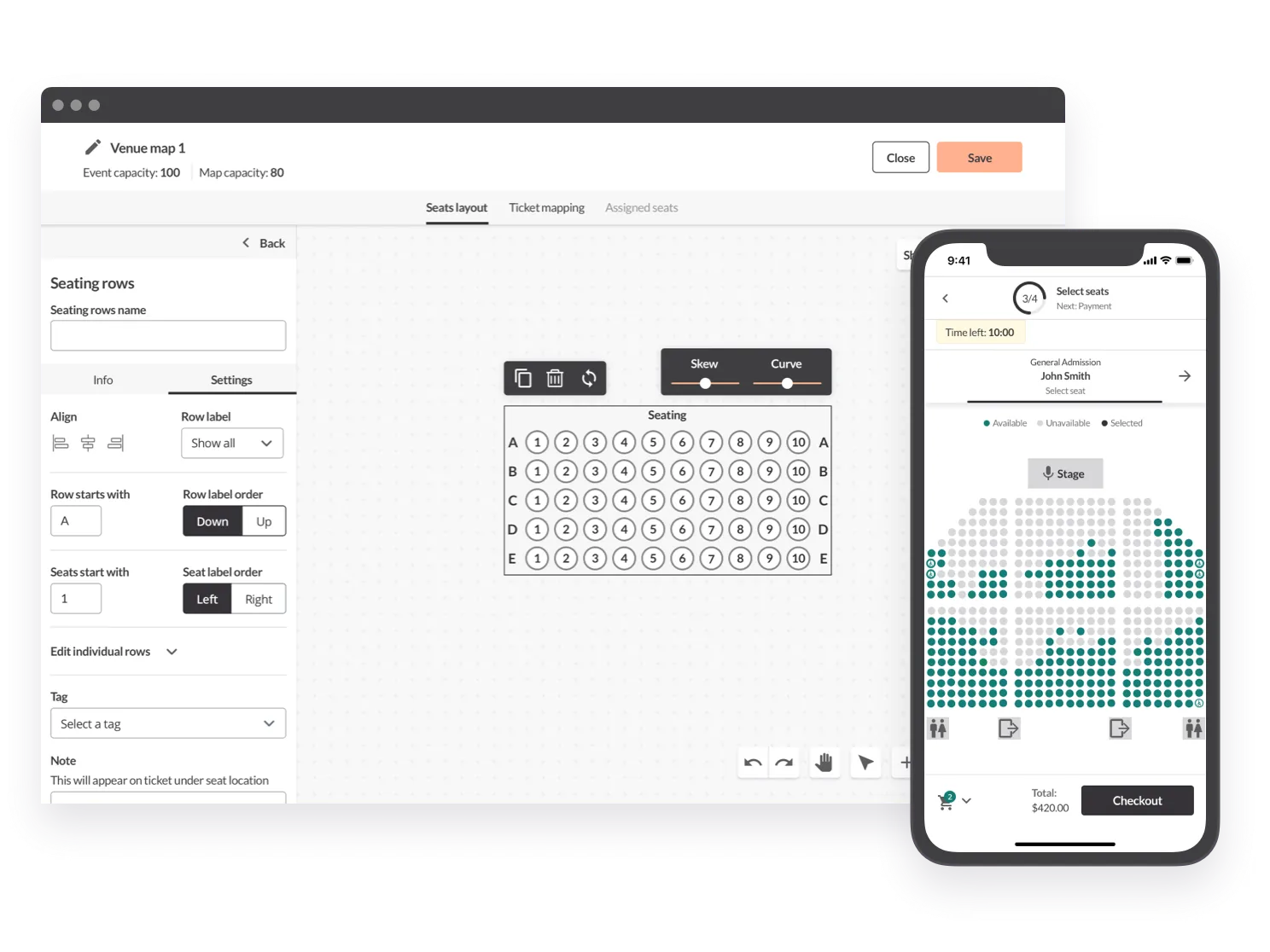Humanitix is a non-profit organization that has been transforming the way ticketing works since their launch in 2016. By using their technology and services, events both big and small can run a modern event, all while, in parallel, raise money for educational causes.
In Episode 167 of the Disruptors for Good podcast, I speak with Joshua Ross, Co-founder of Humanitix, on turning annoying booking and ticketing fees into a force for good.
Listen to more Causeartist podcasts.
Their mission is to make a difference with every ticket sold.
The organization exists to close the education gap – but they can’t do it alone. That’s why have a community of Partners and Supporters who are each doing amazing work for a better world.

How Humanitix Works
The process starts by signing up on the Humanitix website, which provides access to all of their features. Once signed up, you can create your event(s), sell ticket, and manage your entire event process.
Every time someone purchases a ticket through Humanitix’s platform, a portion of the proceeds will be donated to a partner charity that focuses on education. This way, you can facilitate meaningful change while running your event smoothly and effectively.
The organization also offers the ability to create discounts for your events such as student groups or charities so more people can access the platform and use it for good causes.
Humanitix Features

Humanitix offers an array of modern technology features, from ticketing, custom event pages, backend event management, to payment processing, that enable event organizers to easily manage their events.
Furthermore, they provide support and advice on how to maximize the impact of each event. Their technology also offers insights into who is attending each event and what their preferences are, allowing organizers to tailor experiences accordingly and increase engagement with their audience.
Features breakdown:
- Customize your event’s unique brand look and feel with Canva design tools in our event builder.
- Sell books, reusable coffee cups, funky hoodies, or anything your guests might need.
- Manage capacity or offer crazy combinations. Their tools make it simple to do so.
- Event seat maps that showcase tables, auditoriums, even market stall allocations.
- An epic support team ready to help with any aspect of setting up your event
- Release new tickets and notify waitlisted guests automatically as soon as additional tickets become available.
- Their free app means anyone can staff the door, scan tickets and welcome guests – even volunteers, and interns.
- Email your audience and guests before, during and after the event.
Humanitix Accessibility

ANother huge part of the Humanitix mission is to enable greater community participation and social inclusion for the more than one billion people worldwide who have been excluded from events due to their disabilities.
The organization is taking steps towards establishing an exceptional platform that can provide all individuals with a welcoming, accessible experience at gatherings across all communities and culture.
They’ve built world-first tools that help people find events that accommodate their individual needs and interests, from sign language interpretation to wheelchair accessibility.
Humanitix’s Impact
The Humanitix mission is summed up easily in their giving model. Turning annoying booking fees into a force for good. Through the revenue from booking fees Humanitix funds education projects for the world’s most disadvantaged children to close the global education gap.
To date, the organization has donated $2,540,040 + to educational projects around the world.
Hosting events on Humanitix is not only a great way to connect, but also helps make the world brighter for disadvantaged kids. Each event has an impact and can help create a future of equal opportunity.
By utilizing Humanitix’s technology and services, event organizers can make a positive impact on society while managing their events more efficiently than ever before.
With no setup fees or commission charges for using Humanitix’s services, there is no reason not to try this innovative non-profit out in order to make a difference in your community through fundraising activities.
Thanks to Humanitix’s cutting-edge technology, it has never been easier to do good while enjoying great success with your event planning efforts.
Interview Transcript
00:10
Host: Well, thank you so much, Josh, for joining me today. I’m super excited that we finally get to have this conversation. It’s been a while. The last time we spoke, you were just expanding into the United States, so this is a great time to catch up. Before we get into what Humanitix is now and its future, can you talk a little bit about your journey and why you started Humanitix? What’s the path?
00:35
Josh Ross: Yeah, thanks, Grant, and great to be catching up again. I started Humanitix with my best friend, Adam McCurdy. We went to the same high school but in different years.
We became really good friends at university. You can probably tell from my accent that I’m from Australia. In Australia, when we go to university, we generally live at home with our parents, work a job, and travel with the money we can save. So, I did about two years of backpacking on a shoestring while doing my degree, and about half of that was spent with Adam.
We traveled mostly in low-income countries like Laos, Vietnam, Cambodia, Sri Lanka, and India. You really get to see how lucky you are back home in a place like Australia, with great healthcare and education. We felt a moral duty to give back.
We read a few books, one in particular, “Banker to the Poor” by Muhammad Yunus, who founded Grameen Bank. He lifted millions out of poverty with a nonprofit bank that gave loans to help people start businesses in rural parts of very poor countries. That inspired us. We didn’t want to go back to Sydney and get jobs in companies we didn’t care about. We wanted to do something impactful.
We decided to create a technology charity that disrupts an industry for good. We noticed how annoying booking fees were and thought, “Who are these ticketing platforms, and why are fees going up?” So, we decided to do something about it. Instead of greedy shareholders, we’d have the world’s poorest children as our shareholders and build a technology charity. That was the start of Humanitix. It wasn’t a light bulb moment; it was a 10-year journey of exploring and searching.
03:29
Host: How would you explain Humanitix to someone who hasn’t heard about it yet? What’s the pitch?
03:42
Josh: Humanitix is a ticketing platform, like Eventbrite. Event organizers use it to build, manage, promote events, sell tickets, and collect money. The big twist is that all our profits fund amazing education programs for the world’s poorest children.
This comes at no extra cost to the event organizer. In fact, they save money because our fees are lower than for-profit platforms like Eventbrite and way lower than Ticketmaster. It’s good business to use us.
Nonprofits or social enterprises can use our platform at a sustainable cost price, often less than half of what for-profit ticketing platforms charge. We’ve tried to make it a no-brainer for people who want to do good but might not have the money to donate to charity. By using Humanitix, they create real, tangible good in the world.
04:40
Host: What was the startup process like for you as first-time founders, especially trying to disrupt such a big industry? How did you go about raising capital for a nonprofit?
05:12
Josh: It’s been a journey in three phases. Phase one was coming up with the idea. We were in our mid to late 20s with a little bit saved up but not much. We weren’t millionaires. Building a tech company with no shareholders was tough. No one would fund us, so Adam and I funded it ourselves.
We moved back to our parents’ place, hunkered down on expenses, and bootstrapped for the first two years. Our first few staff were volunteers. We got about 10 people working mostly from Adam’s parents’ place before we got a break. In 2018, we won the Google Impact Challenge, which gave a million dollars in prize money to the best technology nonprofit ideas.
That changed everything. It allowed us to beef up our technology team and made us attractive to other philanthropists. Before that, no one would fund us because they didn’t understand the concept of a ticketing platform as a charity. Atlassian was also an early backer. They’re an incredible company and really helped us.
Phase two was COVID. We were doubling every six months and had become self-funding, but our revenue evaporated overnight. We were in survival mode for 18 months. We kept the team together by slashing our salaries.
We gave our clients the best customer service of any ticketing platform because we didn’t fire our sales and account management teams. Coming out of COVID, we’re in phase three, and we’re booming.
We’re four times larger now, selling hundreds of millions of dollars in tickets across Australia, New Zealand, America, Canada, and the UK. We have offices in Sydney, Denver, and Auckland. We’re in a massive, exciting phase and this year, we’ll give $3 to $5 million to education programs. The fruits of seven years of hard work are finally paying off.
08:55
Host: What did companies like Google and Atlassian bring to the table besides capital?
09:18
Josh: It’s a lot more than just capital. Atlassian, in particular, has been amazing. They gave us access to anyone in their company. For example, when we were expanding to the US, we talked to their treasury team about payment processors and banks. Their cybersecurity team helped our team by trying to hack our platform and then working with us to improve it.
They’ve been incredibly supportive. Google gave us a great budget for YouTube and Google AdWords, which we don’t pay for. They’ve been good for our brand and provided a massive injection of capital through the competition we won. They’re a much bigger company, so we don’t get the same level of access, but what they’ve provided has been invaluable.
11:28
Host: You mentioned the education programs that Humanitix supports. Can you talk about how you choose these programs and what those partnerships look like?
14:10
Josh: Humanitix itself is a charity with no shareholders. Our pitch to philanthropists was to give us funding to build this ticketing platform, which would become self-funding and then funnel profits into education programs.
In Australia, our domestic projects focus on education programs for Aboriginal and Torres Strait Islander children in regional areas. Internationally, we partner with Room to Read, focusing on literacy programs for young girls in low-income countries.
In North America, we partner with Code.org, which teaches computer science to disadvantaged children. We also work with local partners to ensure we’re making a real impact.
16:35
Host: What do you attribute your growth to, especially over the last three years?
17:21
Josh: The ticketing market itself helps us grow because when we ticket an event, our brand gets in front of thousands of people. Word of mouth and the event organizers’ marketing efforts help us grow.
We’ve also used Google Ad Grants and normal marketing methods. Our team has grown to just over 60 people globally, with offices in multiple countries.
18:36
Host: As you look to the future, what are the goals for the next three to five years?
19:08
Josh: In the next three to five years, we need to replicate our success in Australia and New Zealand in the rest of the world, starting with America. If we get it right in America, we could be giving $30 million a year to our projects.
Beyond ticketing, we want to apply this model to other products, like insurance. Imagine if your car insurance profits went to saving the environment. We’re also interested in the concept of data for good.
For example, we have a large newsletter base and could rally them for social campaigns. It’s not our core focus right now, but it’s part of our vision for the future.
22:12
Host: Do you think Humanitix would be where it is if it were a for-profit company? Was being a nonprofit always the vision?
22:35
Josh: We always intended to be a nonprofit because we weren’t looking to become billionaires. The only reason to make it a for-profit would be to scale faster. We wanted to maximize social impact, and we’ve been open to whatever structure would achieve that.
There are arguments for scaling quicker as a for-profit, but we’ve seen the benefits of being a nonprofit, like the support from Atlassian. We’re proving it can be done with this model and hope to inspire more philanthropists to think outside the box.
24:40
Host: Last question—what tools and tech stack do you use to run day-to-day operations at Humanitix?
25:02
Josh: We use Atlassian products like JIRA for project management and their service desk for customer inquiries. We use Slack for internal communication, HubSpot as our CRM, Google Drive for document storage, Keeper for password protection, MongoDB, AWS, and Twilio.
Canva is also a tool we use for design. We were one of the first companies to integrate their button for event organizers to use. We look like a tech company, and we use all the usual suspects you’d find in one.
26:10
Host: Congratulations on your success so far. It’s great to see the impact you’re making. Best of luck for the next ten years.
Josh: Thank you. I really appreciate those kind words. It’s a great place to be now, and I feel incredibly privileged and grateful for what we’ve achieved. Thanks for having me on and giving us a shout-out. Great to connect again.








